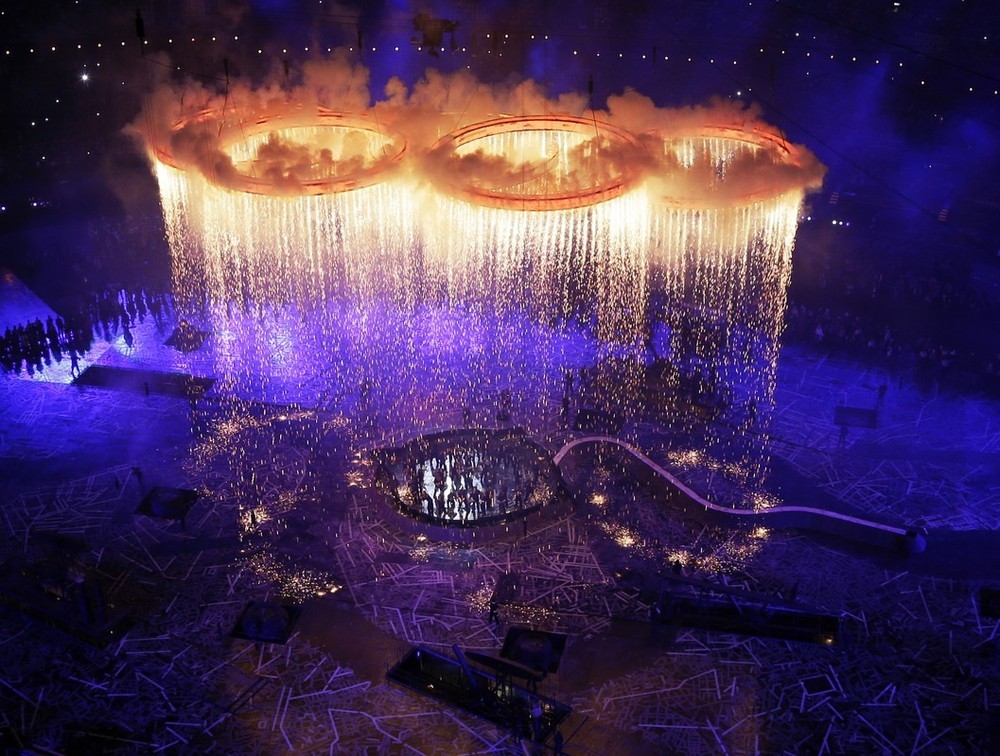
The last post ended by quoting Northrop Frye, the renowned literary critic, from his 1947 book on William Blake, Fearful Symmetry. Frye explains the choice that is even now before England, a choice that seems to have been a major theme of the Opening Ceremony of London 2012. It is worth quoting again this prescient passage:
England has to choose whether to turn its green and pleasant land into Jerusalem or a howling waste of Satanic mills, and Blake is practically the only Englishman who can express the fact that that choice is now before England, and is still a choice. Jerusalem is Blake's contribution to the struggle between the prophet and the profiteer for the soul of England which is England's Armageddon: it is a burning-glass focusing the rays of a fiery city on London in the hope of kindling an answering flame.
The answering Flame arrived last Friday night, but it is still not clear what choice was made. The ceremony itself was about making the choice. Armageddon is very nearly here, but it may be that a clear cut resolution is impossible.
Lots of Fun at Danny Boy's Wake
Danny Boyle has created the Finnegans Wake of Olympic opening ceremonies. Like the Wake, the Opening Ceremony has been criticized for being boring, too long, confusing, dark, full of inside jokes and obscure literary references, disjointed, etc. But also like the Wake, it contained profound depth, lyric beauty, staggering interconnections and coincidences, and the vast scope of epic poetry.
Boyle, using Britain as the microcosm of the world just as Ireland is used in the Wake, tried to encapsulate all of Britain's history, culture, development and spirit in a ceremony of a few short hours. All Olympic open ceremonies do this to a limited extent, but it was the scale, the depth, and the intertwining of all the elements, as well as the overarching narrative conforming to the timeless myths of the Fall and Redemption, that cranks this ceremony up to Wakean proportions.
Just as there is no one interpretation of Joyce's last book, it being too complex and dynamic to allow for any exclusive reading, there can be no single interpretation of Boyle's ceremony -- there are too many elements to include everything. The reading I'll present is likely a misreading. Hopefully it is a creative one.
The ceremony began, also like Finnegans Wake (and this blog will explore this incomparable book in depth in the future), with the story of a river. The Thames is filmed from its source and running all of the way to East London. The river journey will take on immense importance as this analysis builds up.
Tower to the Gods
Before the actual ceremony began at 9pm, there was the prologue which featured an orchestral performance of Elgar's "Nimrod." This is the first clue.
Who is Nimrod? He was a famous hunter whose myth grew well beyond the Bible. He is most well known as being the rebellious, and often imagined as gigantic, ancient king who presided over the construction of the Tower of Babel in a failed attempt to reach Heaven.

This is where we begin the Opening Ceremony. Aside from the persistent rumour that Brueghel's depiction of the Tower is the model for the EU Parliament, is the idea that comes through most strongly in Dante that the Tower of Babel was the blasphemous attempt to construct an artificial Mountain of Purgatory. For Dante, the Tower and Nimrod himself represent the gravest of sins, Pride -- the sin of believing that through cleverness or artificial means alone we can become divine.
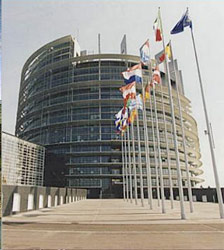
I've been writing on this blog that the 70-day, 8000 mile, London 2012 Torch Relay actually represents a journey through the underworld, and most notably the course of Sirius through the Duat in Egyptian myth. As 8000 miles is the rough diameter of the Earth, the journey of Dante and Virgil through the Earth's underworld in the Inferno also symbolically matches the Torch Relay. Dante and Virgil finally surface at the antipodes of Jerusalem, at the base of the Mountain of Purgatory. This is also where the Opening Ceremony commences.

The Purge
The Glastonbury Tor, as the monks of Glastonbury Abbey believed, is also the Mountain of Purgatory. Boyle's depiction of the Tor also represents this. During the ceremony, the flags of all participating nations were planted in the Tor signifying that now the entire world is making the same perilous, spiralling course up the Mountain.
Like the Glastonbury Tor, like traditional depictions of the Tower of Babel, the Mountain of Purgatory also has seven terraces. On its summit is Eden, the Earthly Paradise, and at the heart of Eden is the Tree of Knowledge of Good and Evil -- the gateway of Da'at. It was here that Humanity Fell and it is here where we will achieve Redemption. The Olympic Games, named after Olympus another World Mountain, is the journey back to the Garden.

Another attempt, like Nimrod's, to use force to climb the Mountain to the stars was made by Ulysess. This story is also relayed by Dante in the Inferno. Dante and Virgil meet Ulysses deep in the eighth circle of hell, and he tells them of his last voyage far across the sea where he discovers an island with the towering Mountain. He tries to land but a great storm prevents him and destroys his ships and his life. Ultimately, his cleverness and his pride had got the best of him. He would have been better to remain Nemo, "No man," and enter Paradise as a selfless individual.

The question is whether after the underworld journey we, at the Opening Ceremony, have reached the base of the true Mountain, or whether it is an artificial counterfeit like that constructed by Nimrod. Or maybe, like Ulysses, we have somehow reached the Mountain but we are not granted the grace to climb it.
The next clue of the Opening Ceremony comes with the children's choir singing the hymn, Jerusalem. This is the hymn of England. Three other children's choirs sing traditional songs of Ireland, Scotland and Wales (also represented by the four patron saints). The lyrics of Jerusalem, written by Blake as a prelude for his epic, Milton, deserve to be displayed again here:
And did those feet in ancient time
Walk upon England's mountains green?
And was the holy Lamb of God
On England's pleasant pastures seen?
And did the Countenance Divine
Shine forth upon our clouded hills?
And was Jerusalem builded here
Among these dark Satanic Mills?Bring me my bow of burning gold!
Bring me my arrows of desire!
Bring me my spear! O clouds, unfold!
Bring me my chariot of fire!I will not cease from mental fight,
Nor shall my sword sleep in my hand,
Till we have built Jerusalem
In England's green and pleasant land
As is well-known, the subject of this poem is the myth that Joseph of Arimathea and his young nephew, Jesus, once visited England, and possibly the Glastonbury Tor. Blake is vowing to not cease his "mental fight" against the "Satanic Mills" of Church, State and Industry in order to transform his country into the New Jerusalem, or Zion, and thereby make it ready for the Saviour's return.
The Opening Ceremony begins with this green and pleasant land. This may be the Garden, but this is not yet the Holy City. London 2012 is not yet Zion. Quickly the Satanic Mills come to blacken the land and the Fall commences.

This is the section of the ceremony which Boyle calls, "Pandaemonium," and mainstream commentators assured us that it depicted England's Industrial Revolution. This is true, but it is much more than this.
On the stage, coaches of the London General Omnibus Company arrive with a group of industrialist/banker types in dark suits and top hats, led by the famous civic engineer, Isambard Kingdom Brunel. Brunel, renowned for his construction of several bridges, railways, dockyards, ships, etc., was most certainly a freemason. A Masonic lodge in Watford, just outside of London, is named in his honour.

In the analysis of this blog, unlike many others, being a freemason is not automatically condemnable. Reality is complex and there is good and bad in everything. It does mean, though, that as a symbol Brunel is very like Humphrey Chimpden Earwicker, the "hero" of Finnegans Wake. Earwicker, mostly referred to by combinations of the initials HCE in the Wake -- as in Here Comes Everywhere -- is also described as being a master builder and a freemason.
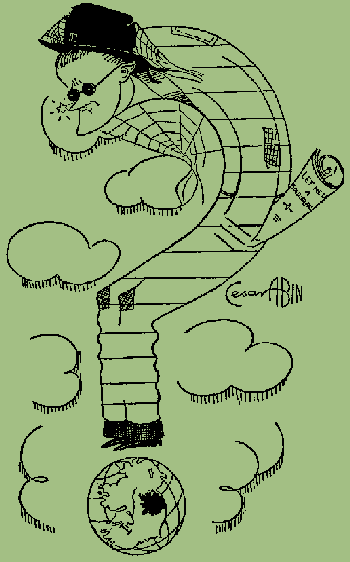
HCE is also a symbol for the Fall. Additionally he is the hod carrier, Tim Finnegan, who falls off a ladder, dies, and is "resurrected" by a splash of whiskey at his own wake, in the Irish folksong which gives Finnegans Wake its name.
In Boyle's ceremony, then, Brunel also signifies the Fall -- he oversees the transformation of England's green and pleasant land into the Satanic mills.
Brunel walks up the base of the Glastonbury Tor, the World Mountain -- another symbol of HCE, and delivers a speech from one of Shakespeare's final plays, The Tempest:
Be not afeard, the isle is full of noises,
Sounds and sweet airs, that give delight and hurt not.
Sometimes a thousand twangling instruments
Will hum about mine ears, and sometime voices,
That, if I then had waked after long sleep,
Will make me sleep again: and then, in dreaming,
The clouds methought would open and show riches
Ready to drop upon me, that, when I waked,
I cried to dream again.
(Shakespeare's The Tempest, III, ii)
This is the major speech of the whole Opening Ceremony, and indeed this is the passage that provided Boyle with the title of the entire event, "Isles of Wonder." The Isles here of course refer to the British Isles, but they are also Prospero's island in the Tempest, the river-bound island that the Olympic Park is situated in, the Isle of Avalon of the Glastonbury Tor, very possibly the similarly river-bound island of Hades in the underworld, and the island of Mount Purgatory.
All of these islands are, in a symbolic sense, one.
This is an enchanted island. It is an island of magical noises where the realms of dream and waking life are blended and melded. On the Mountain of Purgatory, Dante also had several dreams, often of a subtly erotic content, that began to blur the bounds between sleeping and waking.
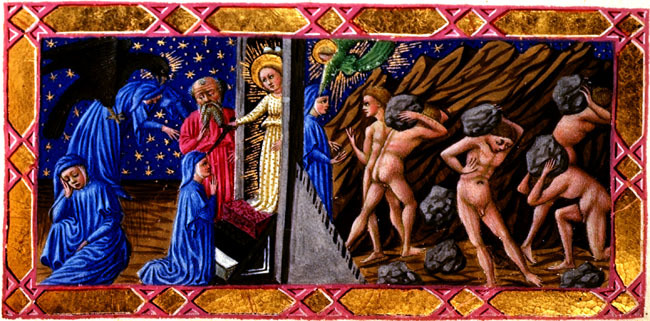
According to Carl Jung, and later theorists like Terence McKenna, this boundary dissolution between the realms of waking "reality" and dream, along with the accelerating upswelling of synchronicity, is a key feature of the collective psychic shift from one Age to the next that is occurring right now.
Purgatory is an intermediate realm where all boundaries dissolve. It represents the rapid transition from the human to the divine, the rush up Mount Olympus. Throughout the Opening Ceremony we witnessed this blurring of dreaming and waking, fantasy and "reality."
Brunel, on the World Mountain, inaugurates the Industrial Revolution in England -- during his time the centre of the most powerful world empire, by using his imagination to envision a transformation of the world. It will become a very dark transformation.
On the Tor, Brunel gives the beautiful speech of Caliban, the slave of the magician Prospero, and the son of the sorceress Sycorax and a devil. This passage, among the most lyric in Shakespeare, is full of ambiguity. Caliban, a man-devil, and at the time drunken and murderous, speaks words that show that he understands the mystical nature of the island even better than his master, Prospero. In a way, Caliban here becomes Prospero, or the two are shown to be the same.

Council of Devils
This section of the ceremony is called "Pandaemonium" and, while the name is taken from a book on the Industrial Revolution, as Boyle readily admits the original name is taken from the capital city of hell in John Milton's Paradise Lost.

Pandaemonium, (the city of all devils), is the setting of Book 2 in Milton's epic poem. All of the main demons are gathered in a council and are discussing the best way to make their revenge, and to conquer Heaven. Open warfare is ruled out as too risky, so they settle upon conspiracy and deception.
They decide that the easiest way to disrupt the plan of God is to subvert and then enslave the newly created Garden of Eden. This would be accomplished best by trickery. Satan decides to take on this task himself and, to the astonishment of the other demons, volunteers to venture through the chaotic Abyss, the realm of emptiness between Heaven, Hell, and Earth. Here is how Milton himself introduces this book:
The Consultation begun, Satan debates whether another Battel be to be hazarded for the recovery of Heaven: some advise it, others dissuade: A third proposal is prefer'd, mention'd before by Satan, to search the truth of that Prophesie or Tradition in Heaven concerning another world, and another kind of creature equal or not much inferiour to themselves, about this time to be created: Thir doubt who shall be sent on this difficult search: Satan thir chief undertakes alone the voyage, is honourd and applauded. The Councel thus ended, the rest betake them several wayes and to several imployments, as thir inclinations lead them, to entertain the time till Satan return. He passes on his journey to Hell Gates, finds them shut, and who sat there to guard them, by whom at length they are op'nd, and discover to him the great Gulf between Hell and Heaven; with what difficulty he passes through, directed by Chaos, the Power of that place, to the sight of this new World which he sought.

Funeral Games
As Satan enters the Abyss, on route to the Earthly Paradise just as Dante reaches Eden by climbing Mount Purgatory, his fellow demons of Hell, the denizens of Pandaemonium, hold funeral games for him. And what are the funeral games? They are precisely the Olympics.
Thence more at ease thir minds and somwhat rais'd
By false presumptuous hope, the ranged powers
Disband, and wandring, each his several way
Pursues, as inclination or sad choice
Leads him perplext, where he may likeliest find
Truce to his restless thoughts, and entertain
The irksom hours, till his great Chief return.
Part on the Plain, or in the Air sublime
Upon the wing, or in swift Race contend,
As at th' Olympian Games or Pythian fields;
Part curb thir fierie Steeds, or shun the Goal
With rapid wheels, or fronted Brigads form.
The "Olympian Games" are held for Satan in honour of his voyage through the Abyss, just as similar games were held for Achilles' best friend, Patroclus, in the Iliad, and for Aeneas' father, Anchises, in Virgil's Aeneid. Historically, the Olympics directly stemmed from these funeral games.

It is amazing, given the working narrative of this blog, that the "Pandaemonium" section of the Opening Ceremony, referring both to Blake's Satanic Mills and the Industrial Revolution, also refers to a book in Paradise Lost in which the Olympian Games are held for Satan as he journeys through the Abyss. How is that for a strange coincidence?
Oak Door of Eden
In addition to corresponding to Joyce's HCE, and Shakespeare's Caliban/Prospero, Brunel can also be identified with Milton's Satan. What is represented in "Pandaemonium"is the Fall, is Satan's subversion and overthrow of the primal Garden. We see this in the transformation of the utopian green lands surrounding the Tor into industrial Hell.
Satan's minions, depicted as industrial workers but more akin to Tolkien's orcs, descend from a passage underneath the Oak atop of the Glastonbury Tor. As we've discussed before, the Oak is the door, it is Da'at, and it is a door that opens in two ways.

It can be opened from the path of Gimel up through the hidden sephiroth, Da'at (G to D, or God), or it can be opened from the opposite direction through Da'at and down into the thirteenth path of Gimel (D to G, or Dog representing the Dog-star, Sirius).
Robert Anton Wilson, in his seminal text, Cosmic Trigger, explains the cosmic ambiguity of this gate, and how this is alluded to in the work of James Joyce and Aleister Crowley.
And, on rereading Joyce’s Ulysses for the first time in several years, the Metaprogrammer was struck by the Black Mass in which the souls of all the saved chant "Gooooooooooooood" while all the souls of the damned chant "Doooooooooooooog."
This palindrome (God-Dog) also appears in The Book of the Law, remember, in the question, "Is a god to live in a dog?" My fantasy leaped and I asked myself why Joyce set Ulysses in spring 1904, the same time that Crowley was receiving The Book of the Law.
His crucial question about 1904 will be explored in a future post, but the main point to note is that the door opens both ways -- the Abyss that Satan traverses to reach, and so subvert, the Earthly Paradise is symbolically the same as the Mountain of Purgatory. The portal of Da'at, situated as the Tree on top of the Mountain, allows for both ascent and descent. In this time of transition both passages are occurring at once.
As the industrial orcs of Satan/Brunel pour down from the Oak portal of the Tor, they rip up the green land, build vast machines and smokestacks, and thoroughly defile the countryside. Eden is shut off from humanity. The Fall has taken place.
To Rule Them All
A dark alchemy infests the land and the people, industrial slaves, spend all of their time and effort to forge the One Ring. This is elevated to the sky to unite with the four other rings of the Olympic insignia.
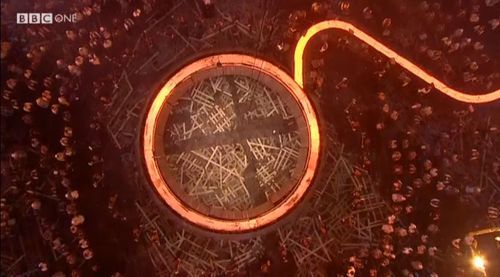
The Olympic Games, the false union of humanity, is used as the justification for the subjugation of nature and the industrial enslavement of humanity. The dream turns to nightmare. In Blake's terms, the Olympics represents the triumph of the Satanic Mills. Brunel/Caliban/Satan/Sauron nods his head in great satisfaction.
When the Cauldron is finally lit at the end of the ceremony, it resembles nothing more than the Eye of Sauron -- but we are getting ahead of the story. Boyle's hat tip to Tolkien's masterpiece is really not surprising given the wealth of other literary references he includes. As Jay Weidner writes in a fascinating essay, The Lord of The Rings is really a modern story of the shift of the Ages. Boyle's ceremony is also this and symbolically it makes sense that the Cauldron is the Eye. The New Jerusalem is created but is it a counterfeit?


But there is no time to think about any of this. The next sequence is too funny -- the Queen as skydiver. What could be occult and nefarious about something so lighthearted and playful? All should be forgiven in comedy, right? Perhaps so, but this should not keep us from looking deeper.
The Royal Astrologer
There is good reason to conclude that Prospero, the principle but morally ambiguous protagonist of the Tempest, was modeled after the English Renaissance magician, John Dee. By all accounts, Dee was the occult teacher and astrologer of Queen Elizabeth the First.


This blog has already discussed the involvement of Dee and his partner Edward Kelly with Enochian magic and the summoning of spirit entities like Choronzon. Is this why the isle is full of noises? There also good reason to conclude, however, that Dee was a prime intelligence agent for Queen Elizabeth. There is a persistent rumour that one of Dee's personal sigils very much resembled a 007. Whether or not this is historically accurate, Dee is certainly entrenched in myth as being Queen Elizabeth's 007.

In a playful, most certainly harmless, clip in the Opening Ceremony we find Queen Elizabeth (the Second in this case) escorted by her own 007, James Bond, to the Olympic Stadium by helicopter where she apparently parachutes down to adoration of thousands of her subjects. There is no coincidence that the Queen, as Zeus, descends from from her heavenly mountain in the sky to open and preside over the Games. She, nearly alone, does not make an ascent from the underworld.


A Spoonful of Sugar
The next sequence of the Opening Ceremony has proved to be one of the most baffling for international viewers. Why was a tribute given to the British National Health Service? With a bit of research we can see Boyle's connection. According to certain sources, Brunel's inclusion of health and recreation centres for his workers provided the basis for the future NHS.
Boyle sneaks in many such connections into the ceremony. Another was that J.K. Rowlings reads from Peter Pan, a book from which the Great Ormond Street Hospital featured in the sequence receives royalties. The fact that these syncs exist indicate that there are many others to be discovered. Like Finnegans Wake, the whole ceremony is a holographic tissue of interconnection and synchronicity.
The sick kids sequence is really a horror story of disease and nightmare. It is meant to reveal the dark side of the imagination. The whole sequence is accompanied by Mike Oldfield's "Tubular Bells," appropriately the theme music of The Exorcist. The children are faced with all the villains and monsters of British children's literature. All of the beings of nightmare seem to combine in the giant form of Voldemort -- the Fall is complete and Satan has triumphed over even the imagination of children.

But this triumph does not apparently last. The nightmares are dispelled by dozens of Mary Poppinses, descending from the sky with their umbrellas as parachutes. This is an obvious allusion to the Queen's prior descent. Mary Poppins is the only other character, aside from the Queen, who makes this kind of descent.
The central inclusion of Mary Poppins is not a quirky afterthought either. P.L. Travers, the author of Mary Poppins who hated the later depiction of her character by Walt Disney, was a friend of W.B. Yeats and, like Yeats, likely had connections with the Order of the Golden Dawn. Poppins is a mystical dimensional traveller, someone who has the ability to trip between worlds and even into the Abyss.

Yeats, the Irish poet, plays a key part in this whole narrative. He wrote a important book on Blake and he was a major influence on Joyce. He is a crucial link in the development of the universal epic that this blog is tracing. None of this is necessarily evil, it should be noted, but it is very important to understand how deep these symbols go.
Mental Fight
The next sequence was the very popular Mr. Bean/Chariots of Fire performance. Again, conforming to the blurring of dream and reality in Purgatory, this features Mr. Bean's dream. Chariots of Fire itself is another important interconnection. We should remember that in Blake's poem, now the hymn Jerusalem, he asks for his "chariot of fire" as one weapon in his "mental fight" against the "Satanic Mills." The original chariot of fire, as it is widely known, was what allowed the prophet Elijah ascent into Heaven. Even in this seemingly innocent Mr. Bean spoof the deeper message of the Fall and Redemption is contained. What is going on?

The following piece takes us from the industrial age to the electronic age of the late 20th and early 21st century. In rapid succession we move through the decades in a blur of movies, TV shows and popular music. This sequence demonstrates that everything can and will be incorporated into the Spectacle. Even grime music, the subversive backdrop to London's insurrectionary riots of just last year, is a big part of the soundtrack. The System will absorb all resistance and then sell it back to you.
This section has the feeling of acceleration and vertigo. The Singularity is coming. This is not the coming of the New Jerusalem, not a return to the green and pleasant land, but it is the counterfeit rapture we've all grown to expect. CERN scientist, Tim Berners-Lee, is then honoured as the creator and prophet of the World Wide Web. Even this blog right now and you reading it are a part of this unfolding. There is no escaping from this and it is too simplistic to say that it is wholly evil.
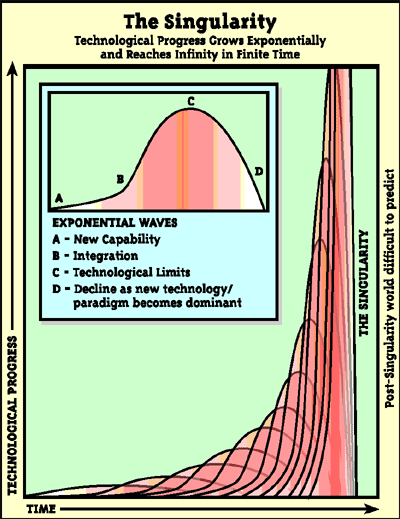
Following this is a sequence in direct tribute to the victims of the 7/7 bombing in London seven years ago. This proved to be too hot for certain US audiences, and it was cut from the NBC broadcast. Why? Perhaps because it made a direct connection between the attacks and London 2012, and NBC did not want to remind people of this. The commentator on BBC, though, spelled this out explicitly:
The excitement of that moment in Singapore seven years ago when London won the games was tempered with great sorrow the very next day.This is much clearer than the handover ceremony at Beijing in 2008 where depictions of the attacks were thinly veiled. Was the elaborate tribute during the Opening Ceremony finally an acknowledgement that a sacrifice was made?
The Star Is Reborn
Next began the long and tedious Parade of Nations, during which each national team struck its flag in the grass of the Glastonbury Tor. Once again, this represents that all nations are collectively ascending the Mountain of Purgatory. We are all making the transition, for better or worse, together. After this was a procession of winged angel-like cyclists that ascended from below. A single cyclist takes flight and rises into the air above the stadium. Satan's journey into the Abyss yet again?

At last the Torch arrives, the culmination of its 70-day journey into the underworld. And appropriately it arrives by boat, just as Sirius, and the Sun etc., ride a boat of the dead in Egyptian myth during its voyage through the Duat. It is very easy to see the parallels. Here Beckham is an obvious Osiris figure. And he is also Brunel. And he is also HCE. And he is also Dante and Satan. People are symbols in this ceremony and symbols have multiple, and even contradictory, designations.

An interesting error is made when the Torch reaches the Stadium. The French announcer correctly states that it has travelled 12,800 kilometres, but the female English announcer explains that it has travelled 12,800 miles. Why would she have made this mistake? Obviously she is reading, so is this error in the script? And it was never caught during rehearsal? It's also fascinating that many smaller news agencies spread this mistake unknowingly -- some even converted the 12,800 miles to over 20,000 kilometers.
Was this an intentional mistake? Was it coincidental? It brings attention to the number 12,800 which reduces to 128, or perhaps 12/8, the 12th of August, which happens to be the date of the Closing Ceremony. Is this significant?
The Cauldron was finally lit by seven torchbearers, not one. This again refers to a collective transformation. The number seven has continually turned up as the number of Purgatory.
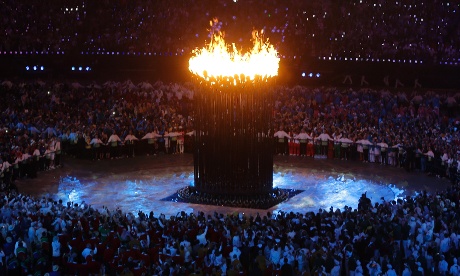
Much can be said about the music that was played during and after the lighting of the Cauldron, but I'll keep this short. Why Pink Floyd's "Eclipse"at a time when light is revealed and not obscured as it is during an eclipse? An eclipse itself, as this blog has pointed out, is also an underworld journey. Is the Torch still in the Duat?
The climax is reached with Paul McCartney and "Hey Jude." Why "Hey Jude?" Presumably because it is very well known and easy to sing along to. But what is its meaning? Why sing it at the closing of the ceremony? The story goes that it was a song written by Paul for four-year-old Julian Lennon during the divorce of his parents.
The unofficial story, though, is that it is a song in praise of heroin -- a slang for the drug is Judas, the friend that betrays you. It is really inconceivable that Paul or Danny Boyle had in mind a paean for heroin to close the ceremony. So why this song? Symbolically, at least, it could be a song for Judas -- the ultimate tool of Satan's plan to subvert the divine plan for this world. In Dante's Inferno, only Satan himself is placed lower in Hell than Judas.

The Two Way Door
So what does all this mean? Danny Boyle has created a masterpiece of ambiguity. Like Finnegans Wake it contains all times and places within British history at once. The whole ceremony can be seen as a microcosm of what we are all moving through at this time. But what happened during the ceremony? Does this represent a movement up the Mountain of Purgatory to the Earthly Paradise, or is it Satan's plunge through the Abyss? Either way the endpoint is Eden.
We are rapidly moving towards the site of the Fall. In the Garden the Tree still waits for us. It is still the Door, Da'at or Knowledge, and we still have the choice of which way we enter through the portal. An ascent or a descent is possible. The shift is collective but it is also individual. Each of us has the ability to use the symbols and rituals to allow for elevation rather than further downfall.
In this way Northrop Frye is not answered. Will the green and pleasant land return? Will the Satanic Mills triumph? The last page is not written but we are rapidly reaching it. Which way does the oak door open? Will we be met there by Christ or Antichrist? Will the city that rises be Zion or Babylon? If we use the Wake as a guide we will see it is all of these possibilities and more at once.
Hi Znore, it's Monk, i must congratulate you on your blog, it is fantastic, i thought i would leave a small message to start.
ReplyDeleteThe link i'm leaving is page four of 12, please scroll down to where i start writing about the olympics from 2012 back to 1936, turn page at bottom:-
http://2012forum.com/forum/viewtopic.php?f=59&t=27298&start=45
This gives star alignments, hope it is useful!
Warm regards, Monk
I have just noticed that you have already linked my Olympics thread up, no matter the first 4 pages are useful for Middle East problems and Arab Spring movement.
DeleteI'm busy leaving your blog on a number of forums at the moment, hope it drums up business!
Monk.
Great stuff, Monk. Thanks! I'm sure that many people here will find your work very helpful.
Deletei was just thinking to myself about dees sigil as an allusion to tubal(2 ball) cain, and up popped a reference to tubal ler bells. crafty.
ReplyDeletePaul McCartney: Scarab Beatles roll the Sun through the Underworld. Judas gives the Kiss of Death to the Solar Savior and nails him to the cross, during which he descends into hell.
ReplyDelete